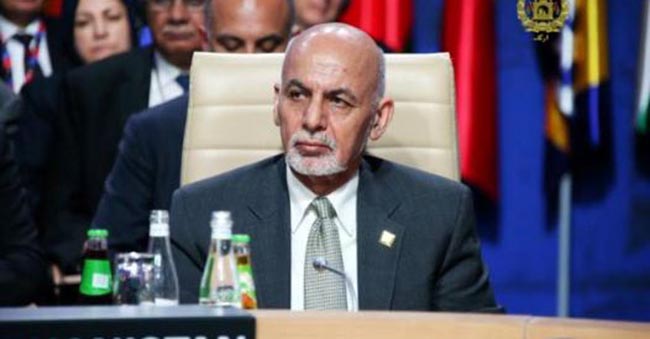WARSAW - President Ashraf Ghani on Saturday said peace was their highest national priority, but reaching peace required understanding the nature of the war imposed upon the Afghans.
“The conflict is multi-dimensional, ranging from Al-Qaeda and Daesh to terrorist groups with Central Asian, Chinese, and Russian origins, to Pakistani groups classified as terrorists by Pakistan and Afghan Taliban groups,” Ghani told the NATO summit of heads of states and government in Warsaw, Poland.
Because these groups posed a threat to the region, the Islamic community and the world at large, Ghani said they had devoted significant efforts to achieve cooperation regionally and within the Islamic community to defeat the groups.
“Our regional initiatives with neighbors are beginning to yield significant cooperative dividends. The exception is with Pakistan-- despite clear commitments to a quadrilateral peace process --- their dangerous distinction between good and bad terrorists is being maintained in practice.”
The Afghan leader said the key problem among Afghanistan’s neighboring states was an absence of agreed rules of the game.
“Thus we seek regional and global support in creating those rules, which will bind us to collective security and harmony. “
Ghani said the discussions within the Arab Muslim community had also been productive, especially the 2015 Mecca declaration against terrorism.
“The terrorist attack against the Mosque of the Holy Prophet in Medina has outraged the Muslim community and should result in a consensus against the tiny minority that is attempting to hijack our civilization.”
The president said with NATO’s resolute support, they would redouble efforts to create a democratic constitutional order and an accountable and effective state that could bring peace to the Afghans and secure their future from the menace of terrorism.
“Proud as I am of serving as the commander-in-chief of our heroic forces, the epithet that I would like to be remembered by is the peace and development president who served as a catalyst to making Afghanistan once again into an Asian Roundabout.”
President Ghani also paid tribute to foreign forces and citizens who paid the ultimate price to ensure Afghanistan freedom.
“We thank political leaders, generals and officers, and the men and women who have fought shoulder to shoulder with us.
“We thank the taxpayers and the civilians from your countries who have dedicated their lives to helping us recover from the estimated $240 billion of economic losses inflicted on us by invasion and conflict.”
Having assumed full responsibility for national security in December 2014, the Afghan forces had displayed commitment to the nation and the constitution through immense sacrifice, thereby earning unprecedented public support and trust.
“They are resilient in the face of adversity, and they have made constant improvements in efficiently and effectively coordinating and building systems of leadership and management.”
He said those developments had enabled the Afghan forces to face and overcome a series of vicious attacks from forces of disorder and terrorism in 2016.
“Thanks to our joint investment in our security institutions, Dr. Abdullah, the CEO, and I can confidently state that the combat role of NATO in Afghanistan is over for good.”
He believed that the range of organized forms and techniques of violence today drew on previous waves of violence throughout history -- anarchism, anti-colonialism, terrorism of the 1960’s and 70s, and violent ethnic and identity movements of the 1980’s and 90s.
“The symbiotic relationship between criminal economic networks--manifested in drug and natural resource wars--and criminal politics is making this Fifth Wave a medium term obstacle to global stability.”
On Afghanistan economic growth, Ghani said through increasing national revenue by 22 percent, they were meeting Chicago commitments to the financing of Afghan forces.
“The key to our success lies primarily in our ability to transform the culture of the state from entrenched corruption to a citizen-centered governance system.”(Pajhwok)
Home » Afghanistan » Peace is Our Highest National Priority: Ghani
Peace is Our Highest National Priority: Ghani

